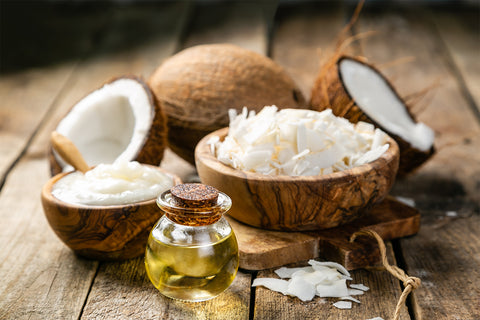MCT Oil vs. Coconut Oil: Which Is Better?

Let's be honest: What was once faced with major apprehension is now having a moment — oil is just about everywhere these days. It's stockpiled in pantries, found in bathroom cabinets, used in beauty regimens, and splashed in coffee.
Considering its ever-growing popularity, it's tough to believe there was ever a time when society was scared of it (and every other fat, as a matter of fact). But as we pushed forward through the years and more research was done, the truth finally revealed itself, proving that healthy fats are really good for you.
The first oil to hit the scene was coconut oil.
This trendy, tasty, and versatile tropical treasure developed quite the following and quickly replaced cooking oils and butter in the kitchen. It was used as an all-natural lip balm, body lotion, and hair serum for those wanting to avoid synthetics.
Dubbed as a 'superfood' and hailed as a beauty "cure-all," the beloved oil enjoyed the spotlight with a whole lot of hype for many years — but then MCTs came into the picture, quickly taking over as the superior oil and leaving its predecessor in the dust.
If you're sitting here wondering what even the difference is between the two oils, we don't blame you for being a bit confused. After all, we've heard that coconut oil contains MCTs — so is there really much of a difference between the two ingredients? And if they do differ, which is better?
You've got questions, and we've got answers. Read on as we explore MCT oil and coconut oil to uncover how they're different and which one is superior.
The Ultimate Showdown: MCT Oil vs Coconut Oil
Despite the controversy surrounding fats back in the day, they are essential nutrients. Your cell membranes, nervous system, and brain are largely made of fats, and they're needed to support our hormone health.
There are many different types of fats which can make things a little confusing. So before we dive into MCTs and coconut oil, here's a quick recap on fat chemistry basics.
Fat Chemistry 101: The Basics
All fats are intricate chains of carbon atoms with hydrogen atoms attached all the way around. On a chemical level, the distinguishing characteristic between fats is the carbon chain length:
- Long-chain fatty acids have 14 or more carbon atoms
- Medium-chain fatty acids have between six and 12 carbon atoms
- Short-chain fatty acids have up to four carbon atoms
Following so far? Ok, great because this is where things can get a bit tricky.
The primary difference between MCT oil and coconut oil is that MCT oil comprises medium-chain fatty acids. In contrast, coconut oil is made up of both medium and long-chain fatty acids.
In other words, MCT oil is a 100 percent concentrated form of medium-chain fatty acids. Coconut oil, on the other hand, usually contains around 50 percent medium-chain fatty acids.
Got It — So, What Exactly Is MCT Oil Anyway?
MCT is short for medium-chain triglycerides. These are saturated medium-chain fatty acids, which means that their chemical structure has six to 12 atoms.
That being said, MCT oil is a liquid fat produced by refining raw coconut or palm oil. This tedious process extracts and concentrates the MCTs naturally found in the plant to create the MCT oil supplement we all know and love today.
Unlike long-chain fatty acids, MCTs go directly to the liver, burning as fuel rather than getting stored in the body as fat. That's why MCT oil is such a hot commodity for keto dieters — it's a quick hack for getting into ketosis sooner rather than later.
What About Coconut Oil?
Made by pressing the oil out of dried coconuts, coconut oil is jam-packed with healthy fats — 80 to 90 percent saturated fat. This gives the popular oil a firm texture at cold or room temperatures.
Although coconut oil doesn't contain MCTs exclusively — smaller molecules, making them much easier for the body to use for energy — it does contain lauric acid, which gives coconut oils its many powerful antimicrobial, antibacterial, and antiviral properties.
When To Use What
Both MCT and coconut oils are great to keep on hand because they are used differently.
MCT oil is a liquid with a relatively low smoke point — so you can use it just about anywhere you would use liquid oil, except for cooking. Some of our favorite ways to use medium-chain fatty acids include:
- Mixed into a smoothie or protein shake
- Drizzled on top of salads, steamed veggies, or grains
- As an energy-boosting additive in your morning cup of joe
- Baked into yummy goods
- Taken as a pre-workout supplement
- Used as a carrier oil for essential oils
Coconut oil, on the other hand, has a relatively high smoke point and works beautifully when used as a high-heat cooking oil. Here are a few ideas on how you can use this tropical ingredient:
- To saute veggies for a delicious stir-fry, soup, or curry
- In baking as a nutritious butter substitute
- To roast potatoes, veggies, or even fruits
- As a tasty tropical-tasting additive to make coffee
You don't have to limit coconut oil to the confines of your kitchen — the versatile oil can also be used for personal care. Some of the most popular ways people use coconut oil include:
- To soothe a sunburn
- Reduce the appearance of stretch marks
- Combat dry, flaky skin
- Heal wounds
- Repel insects
- Moisturize skin
For the highest quality, stick with extra virgin coconut oil.
So, Which Oil Comes Out On Top?
Dietary fats are key to supporting a healthy lifestyle. They help you absorb vitamins A through K, naturally combat hunger pangs, give your cells structure, and are a good energy source.
Needless to say, dietary fat is pretty important!
While there are many different fat sources, MCT oil and coconut oil are super popular for their many benefits.
The possibilities are from adding the two oils into coffee for an extra boost of energy to using them in smoothies and shakes as a simple way to hit your macros for the day when it comes down to using MCT oil and coconut oil endless.
That being said, while the two oils appear to be quite similar, the truth is that they couldn't be more different.
MCT oil is a concentrated source of 100 percent MCTs which are smaller molecules and, therefore, easily digested by the body. Loved for its metabolism-boosting benefits and its role in kick-starting ketosis (and staying in ketosis), MCT oil is extremely popular among keto dieters everywhere.
While coconut oil does contain MCTs, it is far less than its counterpart and is best used as healthy cooking oil or to replace butter. But that's not all — in addition to its use in the kitchen, coconut oil has made a name for itself in the beauty industry, where it's used as a plant-based alternative to lotions, balms, shampoo, and more.
So, which is better? If you ask us, comparing MCT oil to coconut oil is a lot like comparing apples to oranges. To decide which oil is right for you, take into account your goals and needs:
Trying to get into ketosis? MCT oil.
Looking for a natural eye makeup remover? Coconut oil.
Need a quick jolt of energy? MCT oil.
Want a healthy alternative to butter? Coconut oil.
MCT oil and coconut oil serve different purposes, which means that neither one is better.
Here at BioHealth, we have a reputation for creating some of the cleanest products on the planet. Whether you're looking for a phenomenal tasting plant-based protein powder or a powerful blend of nutrients to support you on your ketogenic journey, you can always count on us to provide you with the best of the best!
Sources:
Coconut oil and palm oil's role in nutrition, health, and national development: A review | NCBI
Types of Fat | The Nutrition Source | Harvard TH Chan School of Public Health
